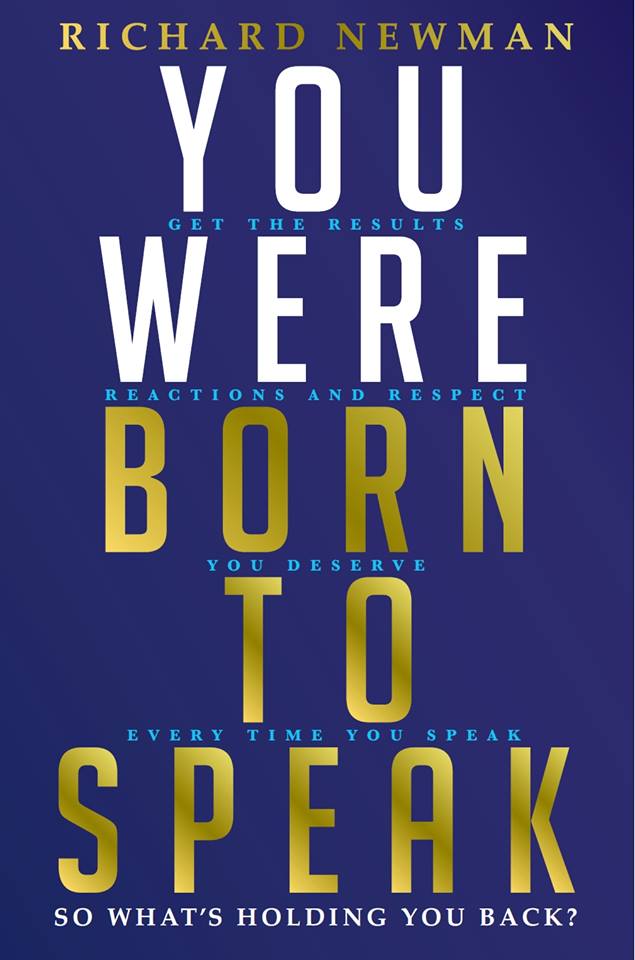
Speak your way to success: Win that deal, promotion or trust of the board through effective communication
Speak your way to success
Win that deal, promotion or trust of the board through effective communication
How you act in an important meeting speaks volumes, warns Richard Newman. Here, the award-winning communications expert reveals the simple things we can do to sharpen our game – and our tongues. Richard has coached more than 50,000 people from 45 countries worldwide and clients include a Formula One team, celebrities and international business leaders. He won the 2014 Cicero Grand Prize Award for Best International Speechwriter, selected from 500 professionals worldwide, and his groundbreaking research into non-verbal communication, conducted in conjunction with UCL, was published by the Journal of Psychology in 2016. The research showed that professionals can increase the rating of their leadership skills by 44 per cent with a few simple changes in their communication style. Richard’s new book, You Were Born to Speak is available now, priced £14.99, from Amazon UK and from www.borntospeak.com . Profits go to AfriKids, Room to Read, and the Tibetan Children’s Education Foundation.
[rml_read_more]
Global Woman sits down with award-winning corporate communication expert Richard Newman to discuss the importance of developing strong speaking skills in a work environment.
Global Woman (GW): It’s well documented that females speak up less than males in business meetings. How can female professionals redress the balance?
Richard Newman (RN): It’s essential to give your ideas a voice. If you can give input to the agenda before the meeting then add an item you would like to speak about near the top. This will allow you to have your voice heard early on, which will build your confidence to keep contributing in your head. If you are concerned about how others will react to your views, speak to a couple of people before the meeting to test the water. This will give you confidence to speak up in the bigger group. Finally, people often hold back through fear of failure or rejection. This means you are effectively visualising or imagining a negative future. Flip this around. Imagine people reacting well to your opinion. This will settle your mind enough to speak out. You may still get rejected sometimes, but you are much more likely to tilt the meeting in the direction you are aiming for if you give your ideas a voice.
 GW: How can we generate great ideas and get them heard?
GW: How can we generate great ideas and get them heard?
RN: We have all had our ideas rejected at some point. Often we look back and wonder why it happened. Why did the other person get the deal, the promotion or approval to move forward, when your ideas and experience were greater? This could be down to office politics or luck, but sometimes there is a hidden challenge we need to reflect on.
The fact is great ideas don’t speak for themselves. You have to do it. You can’t control what people decide, or how the competition behaves. So what can you do to give your ideas, products and career the best chance of success?
In 2016 we created a scientific study to help people get their ideas heard. We wanted to find out if small changes in your communication style could change how people react to your ideas. We involved 2000 people from around the world and the results were extraordinary. We discovered that tiny shifts in behaviour allow you to convince 42% more people with your ideas, even if you say the same words. The results were true for men and women, regardless of age, race or background.
So what do you need to do? It’s not about using silly manipulation devices. Instead you simply need to go back to the way you were born to speak, removing the habits and armour that may have built up throughout the years.
Here are three simple things you can do to ensure your ideas are heard:
1) Take up space – when a child first learns to stand up they quickly realise that keeping their feet together leads them to falling over quickly. Standing too wide makes them immobile. Through trial and error a child realises that standing feet shoulder width apart allows for balance and freedom of movement, regardless of gender. Our scientific results showed a profound bias for people preferring a speaker who stands in this position, rating them 32% more convincing than someone who stands with their feet together. On a simple instinctive level this makes sense. Standing with feet together appears physically weak, low-status and submissive. Standing with feet apart is physically more stable. So the next time you need to make an important point try standing or sitting in a position where you take up your fair share of space. Avoid swaying or leaning on one hip. Stand your ground.
2) Show and tell – we also tested gestures. Many people gesture with low energy, or keep their hands in their lap when sitting, out of view. We found that stillness or limp movements got poor ratings. Instead you must keep your hands in view, making palms down gestures to emphasise strong statements and palms up for warm messages or questions. These work internationally.
3) Pain vs Pleasure – as you explain your idea or pitch, you can also tap into ancient instincts that compel us to act. Countless pitches given on the ‘Dragon’s Den’ or ‘Shark Tank’ have ended with rejection, when one of the judges says, “I don’t understand why I need your product, it doesn’t solve a problem.” So make sure you are very clear about how your idea will help the people you are speaking to move away from pain, problems and challenges that they are currently experiencing. Then describe a better future and tell them how you will help them get there.
This is just a sample of the many things you can do to gain the results you deserve, and I certainly hope this will help you. To find out more you can buy the new book ‘You Were Born To Speak’ from https://borntospeak.com
GW: How, in simple terms, can speaking techniques help corporations and professionals improve their performance?
RN: Knowledge isn’t power. The best products don’t automatically win. Good ideas don’t speak for themselves. Success in business comes from an ability to communicate your knowledge in a way that inspires others into action. The best product only wins if people know about it and care enough to buy it, through how you communicate it’s value. And good ideas will only win if you share them in a way that engages people. Businesses that thrive are those who are able to take good ideas forward quickly through communicating them quickly and persuasively to their team and clients.
GW: In your experience, how much of a role does physical appearances – style of dress, hair, etc. – have in affecting an audience’s perception of what somebody is saying? Do you think this applies equally to men and women or have you seen a gender bias in your studies?
RN: Some people have awkward habits in their body language and are resistant to changing them, saying, “It feels comfortable for me, so I’m just going to keep doing it.” I remind them that the key to great communication isn’t about doing what feels good to you. It’s about focussing on your audience. Who are they? How do you want them to feel? Focus your body language on achieving those goals. The same can be true of clothing. Instead of dressing the way that you feel comfortable, focus on serving your ideas. How do you want people to feel about those ideas? Then dress in a way that will best serve that goal.
GW: How much of a role do you think race/age/gender have in terms of how a message is perceived by an audience – in your experience, can effective body language override sub-conscious prejudice?
RN: This was the most surprising result from our international study on influence. We filmed four actors delivering a short speech: a man and woman with light skin, a man and woman with darker skin. We also aged them 30 years using prosthetics. We filmed a range of different videos with each actor and then showed the videos to 2000 people from across Asia, Europe, North and South America. We had an equal split of men and women, aged from 18-65. We fully expected that we would find big differences based on race, gender and culture. To our surprise we gained the same reactions regardless of the actor in the film or the person viewing them. For example, a young, darker-skinned woman was equally likely to be seen as a good leader as an older, lighter-skinned man. This was true when we showed the video in India or the USA. The only thing that changed how influential people were perceived to be were changes in their body language while speaking, which is great news for men and women. While sub-conscious prejudice may still exist, women can boost their ratings as much as men by shifting from common habits to effective communication behaviours.

GW: If somebody had told the teenage you that one day you would be a leading expert on body language and public speaking, would you have believed them?
RN: No chance! Aged 17 I went along to a school debate, hunkered down in my coat on the back row and tried not to be seen. Then a teacher came along, tapped me on the shoulder, gave me a piece of paper and said, “Get up and read this out to the whole room!” I couldn’t speak or breathe. Eventually I collapsed back into my chair and he gave it to someone else. I decided that I would never be able to speak to a group of people. Then a few weeks later my closest friend was rejected from his dream university due to his communication skills in the interview. He is one of the brightest, kindest, hardest-working people you will ever meet. I decided I would have to get good at communication otherwise I would have no prospects in life. I still never intended to be an international keynote speaker. I just started teaching as a hobby and it grew through word of mouth, so that we now gain 1,000 booking enquiries per year. So no matter what position you are currently in, remember that you can transform your life, little by little, until you are reach a different existence.
GW: What would you say to somebody who already considers that they are a confident speaker, but who is not achieving the business results they want?
RN: Be humble. The hardest people to teach are those who feel they are already good. I feel concerned when clients come to work with us and they rate themselves highly in communication skills, because I know they will be reluctant to make changes. If you are not getting results then you must take ownership. Blaming other people or the situations around you won’t help because you can’t change those things. The only thing you can change is yourself. Remember that confidence and skill are not the same thing. Be prepared to venture into the unknown, adapting your style and storytelling skills until your results improve.
GW: Does a person’s accent potentially impact on their communication, and if so, how can people work around this?
RN: We occasionally have clients who ask to have ‘accent reduction classes’. We find these are rarely the answer. Having an accent makes your voice distinctive and memorable. When people criticise your accent it is usually because they cannot understand your words. The solution for this is often about articulation. Emphasise key words, so that they stand out in each sentence. Slow down by saying a few words, then pausing, before you continue. As long as people can understand your words that resolves most of the big issues.
GW: If you could give one piece of speaking advice to a professional that would instantly improve their business performance, what would it be?
RN: Stop focussing on giving people information. We are not human doings, we are human beings. Therefore, in every interaction, focus on how you want people to feel. This is not about manipulation, but instead about service. Aim to serve your ideas, information and the people around you by considering, ‘in order for us all to succeed how do I need people to feel about these ideas?’ Then focus your body language, voice, content and slides on achieving this goal.





